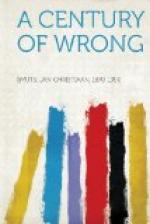[Sidenote: The Africander spirit of liberty]
As is forcibly expressed in an old document dating from the most renowned period of our history, there grew out of the two stocks of Hollanders and French Huguenots “a united people, one in religion, united in peaceful reverence for the law, but with a feeling of liberty and independence equal to the wide expanse of territory which they had rescued as a labour of love from the wilderness of nature, or from its still wilder aboriginal inhabitants.” When the Dutch Government made way for that of Great Britain in 1806, and, still more, when that change was sealed in 1814 by a transaction in which the Prince of Orange sold the Cape to Great Britain for L6,000,000 against the wish and will of the inhabitants, the little settlement entered upon a new phase of its history, a phase, indeed, in which its people were destined by their heroic struggle for justice, to enlist a world-wide sympathy on their behalf.
[Sidenote: England’s native policy.]
Notwithstanding the wild surroundings and the innumerable savage tribes in the background, the young Africander nation had been welded into a white aristocracy, proudly conscious of having maintained its superiority notwithstanding its arduous struggles. It was this sentiment of just pride which the British Government well understood how to wound in its most sensitive part by favouring the natives as against the Africanders. So, for example, the Africander Boers were forced to look with pained eyes on the scenes of their farms and property devastated by the natives without being in a position to defend themselves, because the British Government had even deprived them of their ammunition. In the same way the liberty-loving Africander burgher was coerced by a police composed of Hottentots, the lowest and most despicable class of the aborigines, whom the Africanders justly placed on a far lower social level than that of their own Malay slaves.
[Sidenote: Slachter’s Nek.]




